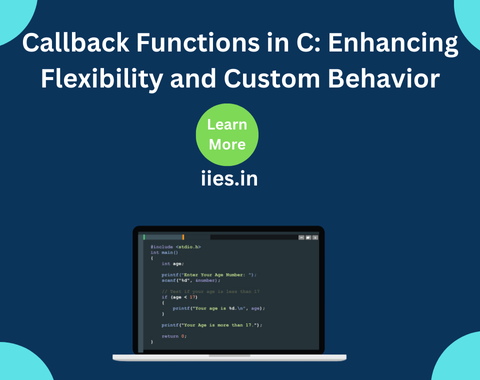Callback function:
This allows the called function to execute the passed function when certain conditions are met or after completing some tasks.
This technique is commonly used to implement custom behavior without modifying the called function’s code.
Structure of a Callback Function in C:
- Define a function that accepts a callback: A function that takes a function pointer as an argument and calls the callback function at the appropriate time.
Example of Callback Functions
#include<stdio.h>
void sum(int result);
int addition( void *sum(int))
{
int result =10+5;
sum(result);
}
void sum(int result)
{
printf(“%d”,result);
}
int main()
{
/*int a=10;int *b=12;
int d=sum(&a,&b);
printf(“%d”,d);
addition(sum); // this is we called as callback function
}
Nested function:
In C, a function can be declared inside another function but cannot be defined there.
This concept, often referred to as lexical scoping, involves defining a function within the scope of another. However, lexical scoping is not supported in C because the compiler cannot resolve the correct memory location for the inner function.
#include<stdio.h>
int main()
{
void outer()
{
int a=10;
printf(“outer function”);
void inner()
{
printf(“%d”,a);
printf(“inner function”);
}
}
inner();
}
The above program is to throw an error

The above error can be resolved using resolved by using including the auto in the inner function
#include <stdio.h>
#include <math.h>
double area( register double a, register double b);
int main(){
double x = 20, y = 30;
printf(“%f”, function(x, y));
return 0;
}
double area(double a, double b)
{
auto double square ( double c)
{
return pow(c,2);
}
return square (a) + square (b);
}


